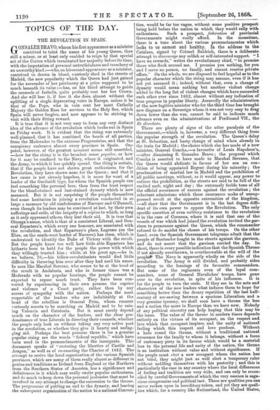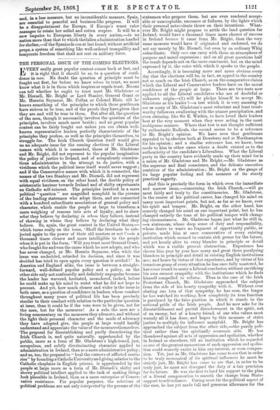TOPICS OF THE DAY.
THE REVOLUTION IN SPAIN.
GONSALEZ BRAVO, who on his first appearance as a minister contrived to taint the name of his young Queen, then still a minor, or at least only enabled to reign by that special
act of the Cortez which terminated her majority before its time, 'with the imputation of personal untruthfulness and treachery of an unworthy kind ;—who, on his second appearance as a minister, contrived to drown in blood, wantonly shed in the streets of Madrid, the new popularity which the Queen had just gained for the surrender of her patrimony at a price supposed to be much beneath its value ;—has, on his third attempt to guide the counsels of Isabella, quite probably cost her her Crown.
And she will lose it, if lose it she does, almost without the uplifting of a single deprecating voice in Europe, unless it be that of the Pope, who in vain sent her most Catholic Majesty the Golden Rose for services to the Holy See, which Spain will never forgive, and now appears to be striving to visit with their fitting reward.
It is true that it is not very easy to form any very distinct idea of the advance of the revolution which broke out in Spain on Friday week. It is evident that the rising was extremely well planned, that it has combined the heads of all parties, from the Moderados to the extreme Progressistas, and that the conspiracy embraces almost every province in Spain. One point, however, of the greatest moment seems still unsettled, —how far the rising is in the broadest sense popular, or how far it may be confined to the Navy, where it originated, and the Army, to which it has quickly spread. One thing is certain, that if the people have not shown great enthusiasm for the Revolution, they have shown none for the Queen ; and that if her cause is not already hopeless, it is more for want of a leader of the Garibaldi type, for whom the Spanish people can feel something like personal love, than from the least respect for the blood-stained and lust-stained dynasty which is now menaced. But it is not surprising if the people themselves feel some hesitation in joining a revolution conducted in so large a measure by old confederates of Narvaez and O'Donnell, even though its leaders may be convinced at last, by their own sufferings and exile, of the iniquity of a re'gime to which, so long as it only oppressed others, they lent their aid. It is true that Olozaga's name, which is that of a consistent Liberal, and Gen- eral Espartero's, which every one honours, are associated with the revolution, and that Espartero's place, Logrono (on the Ebro, on the south-west border of Navarre) has risen, which is understood to identify the Duke of Victory with the revolt. But the people know too well how little able Espartero has hitherto been to hold for the people the power with which they willingly trusted him ; while, at his great age,—he is, we believe, 76,—his fellow-revolutionists would find little difficulty in throwing him over after they had used his name. In men like Marshal Serrano, who seems to be at the head of the revolt in Andalusia, and who in former times was a Moderado with no popular leanings, the people cannot be expected to repose much trust. They have been con- verted by experiencing in their own persons the caprice and violence of a Court party, rather than by any access of sympathy with the nation. Perhaps the most respectable of the leaders who are indubitably at the head of the rebellion is General Prim, whom rumour variously asserts to be marching on Madrid and to be rais- ing Valencia and Catalonia. But it must surely depend much on the character of the leaders, and the clear pre- dominance of true Liberals in directing their counsels, whether the people only look on without taking any very active part in the revolution, or whether they give it hearty and unflag- ging aid. Perhaps the best promise there is for a genuine popular rising are the words "federal republic," which have been used in the pronunciamento of the insurgents. This document speaks of "restoring the liberties of Castile and Aragon," as well as of re-enacting the Charter of 1812. The attempt to revive the local organization of the various Spanish provinces, which are many of them really almost as different in genius and traditions as Ireland from England or the Northern from the Southern States of America, has a significance and definiteness in it which may really excite popular enthusiasm, and do much to keep down the personal jealousies that must be involved in any attempt to change the succession to the throne. The programme of putting an end to the dynasty, and leaving the subsequent organization of the nation to a national Conven-
tion, would be far too vague, without some positive prospect being held before the nation to which they would rally with,
enthusiasm. Such a prospect, federation of provincial Governments might really afford. In the meantime, there is a tone about the various pronunciamentos which looks to us earnest and healthy. In the address to the Catalans, signed by Colonel Baldrich, there is a deliberate attempt to discourage any selfish or self-interested support. "1 have no rewards," writes the revolutionary chief, "to promise those who flock around me. I promise you nothing, for you. and I serve no person, no family, and cannot receive private. offers." On the whole, we are disposed to feel hopeful as to the popular character which the rising may assume, even if it has not yet assumed it ; indeed, without that, even a change of dynasty would mean nothing but another violent change added to the long list of violent changes which have succeeded- each other ever since 1812, almost without any indication of true progress in popular liberty. Assuredly the administration of the now fugitive minister who for the third time has brought new disgrace on a Sovereign whom it was not very easy to drag- down lower than she was, cannot be said to indicate much advance even on the administrations of Ferdinand VII., the Re dissoluto.
There are plenty of signs of the utter paralysis of the Government,—which is, however, a very different thing from the popular strength of the revolution. The Queen's delay at St. Sebastian, and hasty change of mind when already irk the train for Madrid ; the choice which she has made of a new minister, General Concha,—a favourite of Louis Napoleon's, —after dismissing S. Gonsalez Bravo ; the proposal which Concha is asserted to have made to Marshal Serrano, that. the Queen would abdicate in favour of her son on con- dition of being appointed Regent during his minority ; the proclamation of martial law in Madrid and the prohibition of all public meetings, without, as it would appear, any power to enforce the prohibition, as the streets are said to be full of the excited mob, night and day ; the extremely feeble tone of all the official assurances of success against the revolution ; the reluctant admissions which these assurances make of unsup- pressed revolt at the opposite extremities of the kingdom, —all show that the Government is in the last degree diffi- dent of its own power to oppose the Revolution. The only- specific assertion of even military resistance to the revolutioir is in the case of Corunna, where it is said that one of the vessels of war which had joined;the revolution invited the gar- rison to pronounce against the Queen, which the commander, refused to do amidst the cheers of his troops. On the other hand, even the Spanish Government telegrams admit that the people of Santander fought in the streets against the garrison, and do not assert that the garrison carried the day. In short, there is every possible indication that the Spanish Throne if not already overthrown, is overthrowable at the will of the peophil, The Navy is apparently wholly on the side of the revolution. The Army is still divided, and probably sides. according to the leanings of its favourite commanders.. But some of the regiments even of the loyal com- manders, some of General Novaliches' troops, have gone over to the revolution, in spite of his influence. It is for the people to turn the scale. If they see in the acts an& characters of the new leaders what induces them to hope for
something better than the dreary repetition of the last half- century of see-sawing between a spurious Liberalism and a.
very genuine tyranny, we shall soon have a throne the less.
and a nation the more in Europe than we have now. Nobody of any political sincerity can help hoping that this may be the issue. The value of the throne in modern times depends entirely on the virtues of its occupant, on the respect an& love which that occupant inspires, and the unity of national feeling which this respect and love produce. Without a halo round the throne, without a traditional national reverence for the family to whom it belongs, without a force of customary piety in its favour which would be a material loss to the personal life and unity of the nation, the throne is an institution without value and without significance. If
the people must elect a new occupant whom the nation has
not tried, they might just as well elect a temporary ruler without saddling themselves with his posterity ; and this is particularly the case in any country where the local differences
of feeling and tradition are very wide, and can only be recon- ciled by careful Governments of which the very essence is saga- cious compromise and political tact. These are qualities you can never reckon upon in hereditary rulers, and yet they are quali- ties which, for a country like Switzerland, the United States,
-and, in a less measure, but no inconsiderable measure, Spain, are essential to peaceful and business-like progress. It will be a disappointment for Europe, if Europe's worst ruler manages to retain her soiled and rotten sceptre. It will be a .new impulse to European liberty in every nation,—in no nation more than that to which the fallen administration has fled for shelter,—if the Spaniards can at last found, without artificial props, a system of something like well-ordered tranquillity and temperate freedom that shall not rest on military force.































 Previous page
Previous page